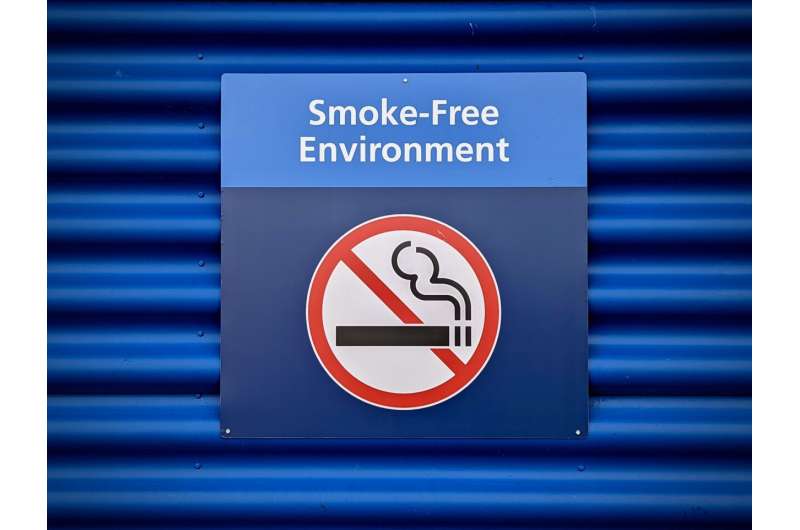This article has been reviewed according to Science X's editorial process and policies. Editors have highlighted the following attributes while ensuring the content's credibility:
fact-checked
peer-reviewed publication
trusted source
proofread
Singapore's smoke-free law may have warded off 20,000 heart attacks in people over 65

An extension of the smoking ban to communal areas of residential blocks and other outdoor spaces in Singapore in 2013 may have prevented up to 20,000 heart attacks among those aged 65+, suggests research published in the open access journal BMJ Global Health.
The extension was associated with a monthly fall in the rate of heart attacks, with older people and men benefitting the most from the move.
Second-hand smoke exposure is responsible for 1.3 million annual deaths around the globe, many of which are caused by heart attacks, note the researchers.
But the existing evidence on the health benefits of comprehensive smoke-free laws, which many countries (67 since 2003) have implemented, is largely confined to indoor smoking bans rather than those for housing estates and outdoor spaces, they say.
In 2013 Singapore extended smoke-free legislation to all communal areas of residential blocks, where 80% of the population lives, as well as outdoor spaces, including covered linkways, overhead bridges, and within 5 meters of bus stops.
This was further extended to all parks in 2016, and to all educational institutions and all buses and taxis in 2017.
To assess the impact of the various pieces of legislation on heart attack rates, the researchers analyzed monthly reports from the Singapore Myocardial Infarction Registry from January 2010 through to December 2019.
During this period, 133,868 heart attacks were reported, 87,763 (66%) of which occurred among men and 80,597 (60%) of which occurred among those aged 65+.
Before the 2013 extension, the prevalence of heart attacks among those aged 65+ was around 10 times that of those under 65. And the rate of cases among men was nearly double that of women.
The overall numbers of heart attacks rose by a rate of 0.9 per million people every month before the 2013 extension. But afterward, this rate fell to 0.6/million, suggesting that 2,097 additional heart attacks, overall, might have occurred without it, estimate the researchers.
Older people and men were the primary beneficiaries of the extended ban. The monthly fall in heart attack rate among those aged 65+ was almost 15 times that of younger people: 5.9/million vs. 0.4/million.
These figures suggest that an additional 19,591 additional heart attacks might have occurred in those aged 65+ compared with 1,325 in those under 65 had the legislation not been enacted, with potentially 4,748 cases averted in men, estimate the researchers.
But subsequent extensions of the legislation weren't associated with a fall in the monthly heart attack rate after 2016.
This was "an unexpected study finding given that public smoke-free laws should reduce environmental smoke exposure in public places, and this should theoretically reduce the risk of smoke-induced [heart attack] cases," highlight the researchers.
But the aging of Singapore's population and the introduction of a new blood test used in hospitals to improve heart attack diagnosis might explain these figures, they suggest.
While the 2017 legislation wasn't associated with a statistically significant decline in the overall number of heart attacks, the average decline in rates occurred across all age groups and in both sexes, they point out.
This is an observational study, and as such, cannot establish cause. And the researchers acknowledge that their findings might not be applicable elsewhere. Nor did they have information on potentially influential factors on heart attack risk, such as disposable income in respect of changing tobacco retail prices or meteorological and air quality data.
Nevertheless, they conclude that their study "provides additional evidence for policy makers who are considering expanding their smoke-free laws to reduce the adverse consequences of population exposure to tobacco smoke."
More information: Association between the extension of smoke-free legislation and incident acute myocardial infarctions in Singapore from 2010 to 2019: an interrupted time-series analysis, BMJ Global Health (2023). DOI: 10.1136/bmjgh-2023-012339




















